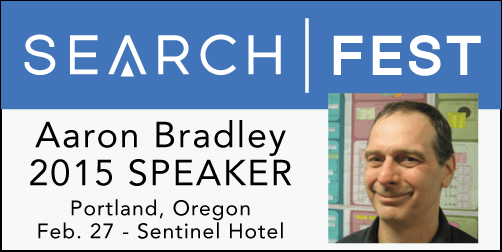 Aaron Bradley will be speaking on “Semantic Juggernaut” at SearchFest 2015 which will take place Friday, February 27, 2015 in Portland Oregon. For more information or to purchase tickets, please click here.
Aaron Bradley will be speaking on “Semantic Juggernaut” at SearchFest 2015 which will take place Friday, February 27, 2015 in Portland Oregon. For more information or to purchase tickets, please click here.
1) Please give us your background and tell us what you do for a living.
I’ve now spent nearly equal portions of my life as a librarian, web designer and search marketer.
That’s in order, so search marketing is more-or-less what I do for a living now. “More-or-less” because, like anyone that’s been doing SEO for any length of time, my roles and responsibilities have broadened and changed over time, and now include not only search engine marketing, but aspects of analytics, social media marketing and website development. In my current position at Electronic Arts I’ve rolled these activities into the collective title of “digital presence optimization.”
2) What major Google update that hasn’t happened yet will happen in the next couple years and what will it fix?
I think the time has come for SEOs to wean themselves off their focus on the Google “update”, at least as the word has been traditionally used to mean an update to Google’s algorithm that results in changes to the ranking of web pages in the search results.
Penguins and pandas and pigeons notwithstanding, the really important changes we can now observe in search are less about updates to how resources are ranked, and more about changes to the search environment itself – that is, updates to how things appear in search. I use the word “things” deliberately because search results are no longer exclusively comprised of links to web pages. The “update”, though, is exclusively concerned with the ranking of links to web pages, which is why it’s so limiting.
In terms of those more pervasive changes I think in the next couple of years we’re going to see fewer of those web links and a lot more data in search results (or data that is a lot more prominent, which diminishes the value of those web links as marketing vectors).
In short, I think we’ll see a lot more “content” (of the good kind) being delivered directly in the search results. Insofar as this will fix” anything, it will almost certainly stem the tide of “content” (of the bad kind) that is in many ways the product of the first generation of search engines.
The second generation of search engines that we’re seeing emerging now will continue to evolve in response to a multi-device universe and a much more seamless universe. While mobile has been prominent in that evolution to this point, I think we’ll see the “Internet to things” play a bigger role in search moving forward.
3) How good is Google at determining content quality from an algorithmic perspective?
Certainly better than it was, but that probably isn’t saying much because it was hoodwinked so often and so broadly in the past.
That’s in regard to the quality of content, though; I think it’s made greater strides in determining the usefulness of content.
Put another way I think the search engines (although not necessarily SEOs) have learned that chasing “quality” is a fool’s errand, since it’s both a relative and subjective measure of something’s value. You’ll have a lot more success, as Google has, determining the usefulness of something because usefulness can be based on quantifiable metrics. What number of query refinements were observed before the user either seemed satisfied with a result or abandoned the query altogether? What resources returned in a result resulted in the fewest number of chained visits for a mobile user with an informational query? And so on.
Improvements in cognitive computing and entity extraction have also allowed Google to do something of an end run around low-quality content. “Content” for search marketers is still largely shorthand for “some stuff residing at a URL to which people will hopefully be directed from the search results.” “Content” for Google is now “stuff I return to users in response to a query”, and that “stuff” isn’t restricted to links to web pages. Some of that stuff may be, in fact, data that was in one upon a time only accessible via a website visit. The end run comes not only from extracting and surfacing that data, which is in itself only a sort of equivalency, but in interlinking it with other data, making it much more useful than that same data embedded in a web document.
Todd Mintz knows PPC…knows Social Media…knows SEO…knows Blogging…knows Domaining…and knows them all real well. He runs growth marketing for )and is also a Director & Founding Member of SEMpdx: Portland, Oregon’s Search Engine Marketing Association, and he can be found here on Twitter and Facebook.
